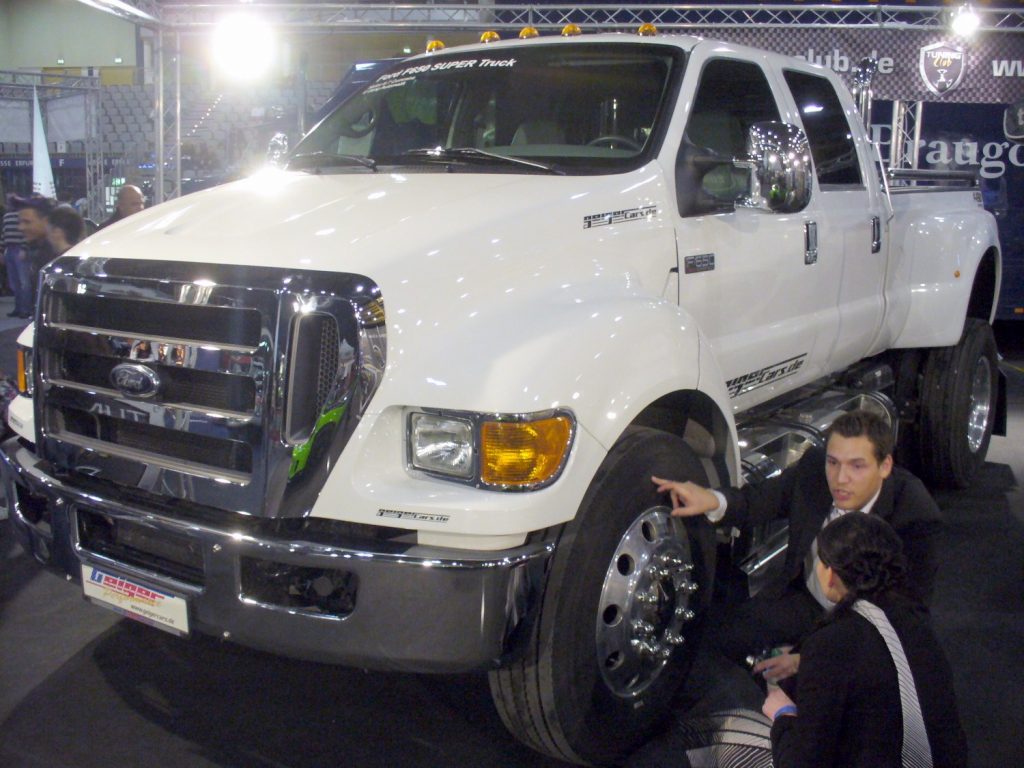Should Vehicles be Taxed by Weight?
All the city news you can use.

Ford F-650. Thomas doerfer, (CC BY-SA 3.0), via Wikimedia Commons
Every day at The Overhead Wire we sort through over 1,500 news items about cities and share the best ones with our email list. At the end of the week, we take some of the most popular stories and share them with Urban Milwaukee readers. They are national (or international) links, sometimes entertaining and sometimes absurd, but hopefully useful.
Discussion on La Sombrita is heated: The most talked about topic in transportation policy on social media and in the press over the last week or so has been La Sombrita, a pilot bus stop structure that is supposed to supply a small amount of shade and light where it is deployed. Heralded by some decision makers in Los Angeles as a way to get something done quickly, it was also derided for being a small crumb thrown at transit riders that deserve better and an example of consultant culture gone wrong. (Joe Linton | Streetsblog LA)
Moving outward from central cities: Even before the pandemic data was showing that housing prices were driving people outwards in urban areas to places with less expensive accommodations. Now that trend might be accelerating and while cities aren’t doomed as a lot of commentators believe, the boom they experienced at the turn of the century is slowing and potentially reversing. (Aaron Renn | Governing)
Watering holes nourish us and our cities: Places to gather and drink, whether its bars or coffee shops are important to the livelihood of cities but they are under threat of larger changes in cities whether a pandemic or high housing costs. Watering holes have always been places to gather, whether on the savannah or our favorite third place. They cultivate politics and culture, and we would be remiss to allow them to decline when we need them the most. (Alicia Kennedy | Yes! Magazine)
We’re running out of sand: The world is running low on the specific types of coarse sand needed to construct infrastructure and buildings. Demand for construction sand is expected to increase 45% over the next few decades while 50 billion tons are already extracted from riverbeds annually. While it might seem like said is abundant in places like deserts, the grains are rounded by wind and don’t bind easily in the mixing process. (Staff Writers | The Week)
Quote of the Week
In the context of zoning, functional-family rules are still a half measure. In the midst of a housing crisis, why restrict living arrangements to any kind of family at all? Still, though in many cases imperfect, these definitions are clearing a path toward a bigger, vital idea: A person’s relationships with their loved ones, irrespective of biological or marital ties, can and should be enshrined in law.
–Michael Waters in The Atlantic discussing how zoning laws over time have unfortunately defined “family”.
This week on the podcast, Setha Low joins us to talk about her book Why Public Space Matters.
Want more links to read? Visit The Overhead Wire and signup.
If you think stories like this are important, become a member of Urban Milwaukee and help support real, independent journalism. Plus you get some cool added benefits.
Transportation
-
MCTS Adds 28 New Buses
 Jul 13th, 2024 by Graham Kilmer
Jul 13th, 2024 by Graham Kilmer
-
MCTS Designing New Bus Shelters
 Jul 10th, 2024 by Graham Kilmer
Jul 10th, 2024 by Graham Kilmer
-
MCTS Updates RNC Bus Detours To Better Serve Downtown, Riders
 Jul 9th, 2024 by Jeramey Jannene
Jul 9th, 2024 by Jeramey Jannene
Urban Reads
-
How Traffic Noise Impacts Children’s Brains
 Jul 1st, 2024 by Jeff Wood
Jul 1st, 2024 by Jeff Wood
-
Number of Super Commuters is Rising
 Jun 22nd, 2024 by Jeff Wood
Jun 22nd, 2024 by Jeff Wood
-
Why Has the Walkable City Been Villainized?
 Jun 9th, 2024 by Jeff Wood
Jun 9th, 2024 by Jeff Wood





















1.Tax by Value is Primary: Personal Vehicles should be taxed by value at time of renewal. People with older/low value vehicles should not be paying as much as new/expensive vehicles.
It’s inequitable due to wealth/income disparities.
2.Tax by weight is secondary:
I’m not opposed if Value is included. Doing both will both unfavorable. Auto Lobbyists will pounce.
3. Semi-Tractors Trailers should be taxed on both weight & value. Their emissions are extreme. Furthermore, Trailer length has substantially increased, approximately 14-15 feet &
most dangerous.
The industry has deep pockets & powerful lobbyists.